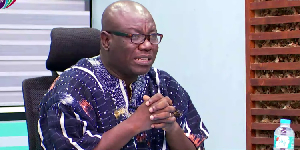By Kwame Okoampa-Ahoofe, Jr., Ph.D.
Garden City, New York
June 13, 2014
Personally, I believe that the first requirement of every serious writer is the need to select one or two major subjects that one considers to be worthy of public discourse, if only because its articulation or resolution is apt to move society forward in a particular desirable direction. For the bulk of the most effective and/or successful writings aims to influence humanity one way or another. This is what the enviable life of the mind is primarily about. And this is also my most significant purpose for writing.
Aside from the preceding, I also like to write for entertainment as well as for the sheer and essential beauty of literary artistry. For humans are the only species of primates - or higher animals - that are known to deliberately and systematically indulge in writing as a means of ensuring our immortality. For example, it is because of his enormous corpus of writings, and the inimitable quality of the same, that Britain's Mr. William Shakespeare has been admired and revered all over the world for some four centuries now, and counting.
And as you may already know, the Akan people of Ghana have since long recognized this incontrovertible fact of the permanence of artistic or memorable speech, both oral and written. We have a maxim that says that "The Tongue Does Not Rot." Of course, this is not to be taken literally; for we are all well aware of the fact that the tongue is one of the first parts of the human body into which the process of decomposition sets shortly after a person's demise.
What we really mean by this maxim is that very thoughtful statements made by keen observers of human nature and existence often become integral to the known and respected body of knowledge that guides the lives, moral outlook and temperament of posterity.
Another remarkable influence on my writing, I mean the widely purported prolificity of the same, is a German-born American professor by the name of Dr. Bernth Lindfors. He has been teaching at the University of Texas, Austin, for ages now and is, incidentally, one of the foremost scholars and authorities on the work of Prof. Chinua Achebe. I have never personally encountered Prof. Lindfors, at least not to the best of my knowledge, but I have read quite a bit of what he has had to say about the place and significance of African Literature, that is, Neo-African Literature, or written African literature in the postcolonial contemporary academy.
In terms of his devotion to African Literature, Prof. Lindfors, in my personal and humble opinion, is only rivalled by Prof. James Gibbs, the renowned and distinguished British-born scholar-playwright, critic and theorist of African Drama. Prof. Gibbs also happens to be my uncle-in-law, and we communicate via E-mail from time to time, mostly at the beginning of every year. He specializes in African Drama and Theater, but like the most erudite of scholars, Prof. Gibbs voraciously reads across the genres. The last time that we exchanged E-mails, he sent me an authoritative critique of Prof. Achebe's last memoir, There Was a Country, largely a sinuous and rambling disquisition on the Biafran War, and also what the recently deceased Nigerian novelist and thinker presumed to be the place of his Ibo/Igbo people within the greater geopolitical entity that is modern, or postcolonial, Nigeria.
Prof. Gibbs, while he boldly takes issue with whether the entire work was personally composed by Prof. Achebe, for the language clearly exhibits stylistic incongruities indicative of more than one hand and mind having gone into the composition of the same is, nevertheless, very charitable, sensitive and respectful of Prof. Achebe almost to a fault. I raise this issue only to make you, Justin, and the general reader, aware of the fact that Prof. Gibbs has spent more than four decades on the work of Prof. Wole Soyinka, unarguably Africa's greatest dramatist of the twentieth century. Along the way, Prof. Gibbs has also managed to compose and have his own plays performed all over the African continent. Prof. Gibbs' critique on the last non-fiction work of Prof. Achebe has yet to be published, and it is likely to generate a groundswell of scholarly controversy.
On a side note, Wofa (or Uncle) James once wrote to me that had I been as studiously engaged in the profound art of drama as I have with poetry (and also political journalism, I suppose), he would have written a book-length treatise on me and my works. You see, Justin, it is such bon mots as the preceding from literary giants and front-bench scholars like Prof. Gibbs that have fired up my literary flair and prolificity.
Regarding Prof. Lindfors, I once read an editorial of his in the newsletter of the African Literature Association (if memory serves me accurately) which he founded and edited for decades, in which the legendary scholar encouraged graduate students destined for employment in the Ivory Tower, or the academy, as teachers and scholars to read, write and publish prolifically and ravenously, as a means of beating the competition and ensuring their permanent and comfortable establishment in the citadels of the contemporary intellectual reserve or repository.
I suppose it was this foresighted and professionally edifying advice that got me going the way I have been going all these post-graduate and professional years, as it were. I also remember E-mailing Prof. Lindfors about the publication of my doctoral dissertation by the University of Michigan's Ann Arbor campus. He never responded; not that I had expected him to. But to my pleasant surprise and rapturous delight, Prof. Lindfors had the titled of my dissertation and a terse summary of the same published in the next issue of his compendium on the latest writings on African literature and culture!
Opinions of Monday, 14 July 2014
Columnist: Okoampa-Ahoofe, Kwame
Dear Justin: About My Writing - Part 2
Entertainment













